111 Search Results for rating scale
May 16, 2019
by Carole Zangari -
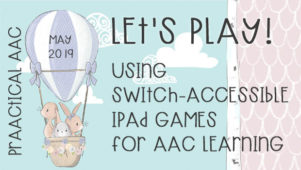
If you’ve been planning to begin using switch-accessible iPad games in your AAC work but haven’t quite gotten it all figured out, this post is for you. We’re delighted to introduce PrAACtical AAC readers to Daniel Rigney, an SLP who with students who have complex communication needs at the Rosedale School in Austin, Texas. Daniel’s professional interests include the AT/AAC Maker Movement (see this post for info on that topic), language development for students with moderate to severe disabilities, and disability rights. He also maintains a YouTube channel, Assistive Technology ATX, with helpful AT content and tips. In this post, Daniel shares the process he uses for integrating iPad games into AAC therapy for students who use switches rather than direct selection. :::::::::::::::::::::::::::::::::::::::::::::::::::::::::::::::::::::::::::::::::::::::::::::::::::: Let’s Play! Using Switch-accessible iPad Games for AAC Learning iPad games can be a great teaching tool for core vocabulary. From having your angry birds “go” to... [Read More...]
October 25, 2018
by Carole Zangari -
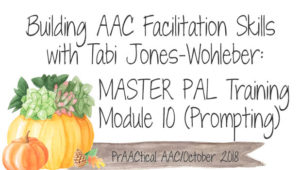
The right types of prompts delivered at the right time in the right amount can be enormously powerful in supporting AAC learners. On the other hand, the wrong type of prompt or prompts that offer too much or too little help can impede learning, self-confidence, and cause other problems as well. In today’s continuation of the Model as a MASTER PAL Training Series, Tabi Jones-Wohleber addresses issues related to prompting. As with the other modules, she provides slides, handouts, video links, discussion points and more. This module should take about 30-40 minutes to present. Looking for the earlier modules in the MASTER PAL Series? Check them out here. :::::::::::::::::::::::::::::::::::::::::::::::::::::::::::::::::::::::::::::::::::::::::::::::::::::::::::::::::::::::::::::::::::: Model as a MASTER PAL Module 10: Appropriate Prompting Facilitator Guidelines What it comes to prompting, it’s important to get it right! Inappropriate prompting can result in decreased quality interactions characterized by prompt dependence, passive engagement, and of course poor use of... [Read More...]
December 4, 2017
by Carole Zangari -
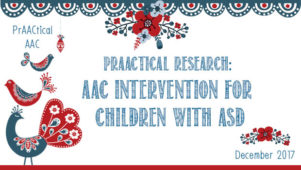
Dr. Kathy Howery is back with another helpful post an AAC research. Kathy is based in Alberta, Canada, and has worked in the field of AT and special education for over three decades. In the past year, she completed her doctoral studies where she used phenomenological methods to seek to understand the lived experience of speaking with/through a speech generating device. Kathy is currently working as a consultant to schools and school districts across Alberta focusing primarily on children and youth with complex communication needs. In this article, she discusses research on AAC interventions. Enjoy! ::::::::::::::::::::::::::::::::::::::::::::::::::::::::::::::::::::::::::::::::::::::::::::: Almirall, D. , DiStefano, C., Chang, Y.-C., Shire, S., Kaiser, A., Lu X, Nahum-Shani, I., Landa, R., Mathy, P. & Kasari, C. (2016). Longitudinal Effects of Adaptive Interventions with a Speech-Generating Device in Minimally Verbal Children with ASD. Journal of Clinical Child & Adolescent Psychology, 45(4), 442-456. What this article is all about (the focus... [Read More...]
May 11, 2017
by Carole Zangari -
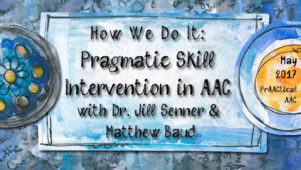
Better Hearing and Speech Month is in full swing and we are excited to see SLPs talking about tools and strategies for supporting people with AAC needs. Many individuals with AAC needs have difficulty using language in expected ways, particularly in social interactions. In this post, we welcome back guest authors Jill Senner and Matthew Baud to discuss ways in which they target pragmatic language in their clinical work. They have a prAACtical approach to this subject and are generous in sharing AAC resources, including vocabulary/pagesets for some popular AAC apps/SGDs. Enjoy! ::::::::::::::::::::::::::::::::::::::::::::::::::::::::::::::::::::: Chat with Me: Pragmatic Skill Intervention in AAC with Jill E Senner, PhD, CCC-SLP & Matthew R. Baud, MS, CCC-SLP Pragmatic skills, commonly referred to as social skills, play an important role in the successful integration of individuals with disabilities. People with disabilities need adequate social skills to live and be educated in the least restrictive environment, to be... [Read More...]
July 27, 2016
by Carole Zangari -

Do you have a love-hate relationships with formal testing? Are you required to use normed tests with your minimally verbal clients? Looking for recommendations on which tests to use? AAC specialist Vicki Clarke has you covered! Like many of you, I’ve had mixed feeling when it comes to using normed assessment instruments with my AAC learners, particularly when we needed to modify the test materials or administration procedures in order for them to be able to participate and respond. If the client can’t point to pictures, give a verbal response, or sit through an entire test, we have no choice but to adapt how the test is administered. As we all know, when we adapt test materials (e.g., putting the test items on an eye gaze board) or procedures (e.g., partner-assisted scanning), we lose the ability to use the normative data. We can, though, compare our learners to themselves at... [Read More...]
June 28, 2013
by Carole Zangari -
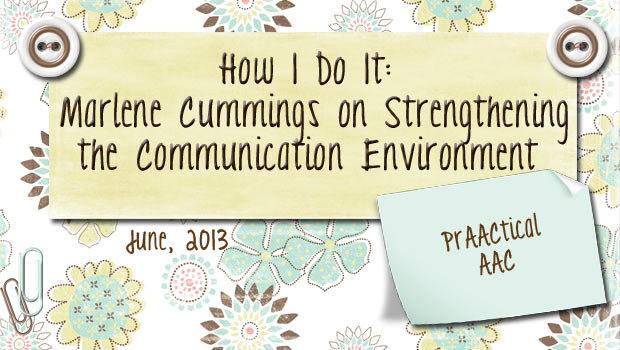
Marlene Cummings is back to share some thoughts on creating communication-friendly environments. As an AAC consultant to the Oakland Schools, Marlene gets to support AAC implementation in a variety of classrooms with all types of learners. You can read her earlier posts here and here. ::::::::::::::::::::::::::::::::::::::::::::::::::::::::::::::::::::::::::::::::::::::::::::::::::::::::::::::::::::::::::::::::::::::::::::::::::::::::: 5 Things to Consider in the “Communication Environment” The first thing we want to ask: Is language being represented visibly? We in AAC are often known by our “stuff”. Because we need to represent language visibly and love technology, we typically have a lot of “stuff”. I, for one, currently have a large storage unit holding 30+ years of “stuff” waiting to be distributed to all my new teams since I am no longer in the classroom. Let’s start by looking around our instructional environment. It is our intention to model the use of language being represented visibly and to provide the vocabulary and opportunities for... [Read More...]
June 13, 2013
by Carole Zangari -
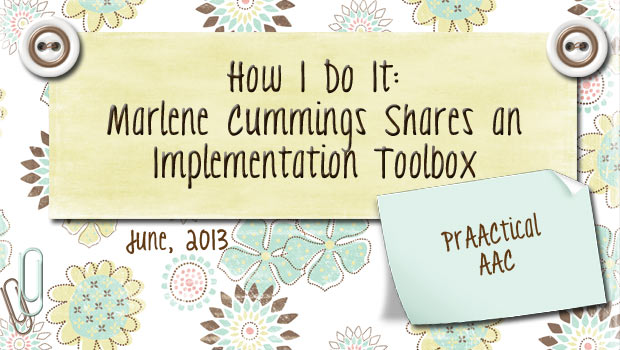
Now that the school year is winding down, some of you have a little more time to read, process, and prepare for next year. We are really excited to share more ideas from Marlene Cummings, one of the most experienced AAC SLPs that we know. Those of you who have been following Marlene’s posts on the AAC implementation will be pleased to see the next part of the Framework for Success that she developed with the AAC Team at Oakland School District. If you missed her first and second posts, go take a peek at them when you can. 5 Things in our “Implementation Toolbox” When we begin the process of implementing AAC it is important to consider our “thinking”. We always want to approach every student, every team and every classroom with as much wisdom and respect as possible. One of my colleagues, Dr. Penny Hatch, from UNC Chapel Hill... [Read More...]
April 5, 2013
by Robin Parker -
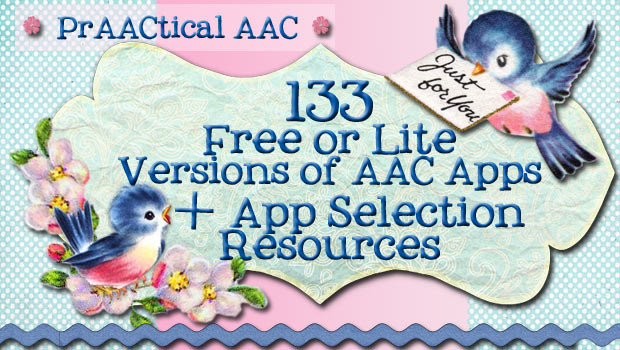
Here is our most recent update of free and lite versions of AAC apps for iOS and Android platform devices + a variety of resources related to AAC app selection. We strongly continue to advocate for a systematic process for AAC app selection. We recommend AAC app decision making in the context of a feature match process that gives appropriate attention to the full range of AAC options. Tools to Use In Making Decisions About AAC Apps Feature match form developed by Jessica Gosnell at Boston Children’s Hospital Feature match checklist created by Scott Marfilius and Kelly Fonner Our supplemental rubric covering language and communication features, RELAAACs Places to Go to Find AAC Apps and Reviews Comprehensive AAC app list for iPhone and iPad by Jane Farrall AAC Tech Connect’s Apps Assistant OCALI’s listing of apps for individuals with ASD Tech in Special Education Aidis Trust Communication App Reviews Training... [Read More...]
February 7, 2013
by Carole Zangari -
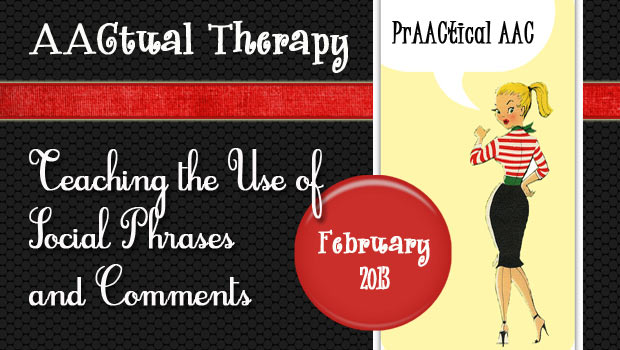
We are so happy to have Deanna Wagner back with more AACtual Therapy. In her previous post, Deanna talked about her work with AAC groups for adults. Today, she shares a lesson plan and some implementation ideas. As a veteran AAC interventionist, Deanna’s therapy plan has many wonderful features that undoubtedly contribute to the success her students experience. Lesson/therapy Session: Using Social Phrases/Comments Intended audience & type of AAC: All devices/AAC users should have access to social commenting. Our Class: Middle school, self-contained classroom. Group of 3 students, SLP leading activity, paraprofessional, and Teacher of Visually Impaired supporting Goal for Overall Lesson: Use word/icon combinations to express opinions or make social comments Specific Student Goals: Student #1 will combine 2 icons for social interjections – please, thank you, cool, awesome, yum, yuk, ok (ECO2 from PRC) Student #2 will functionally use new phrases to chat or indicate an opinion (Dynavox... [Read More...]
December 25, 2012
by Robin Parker -
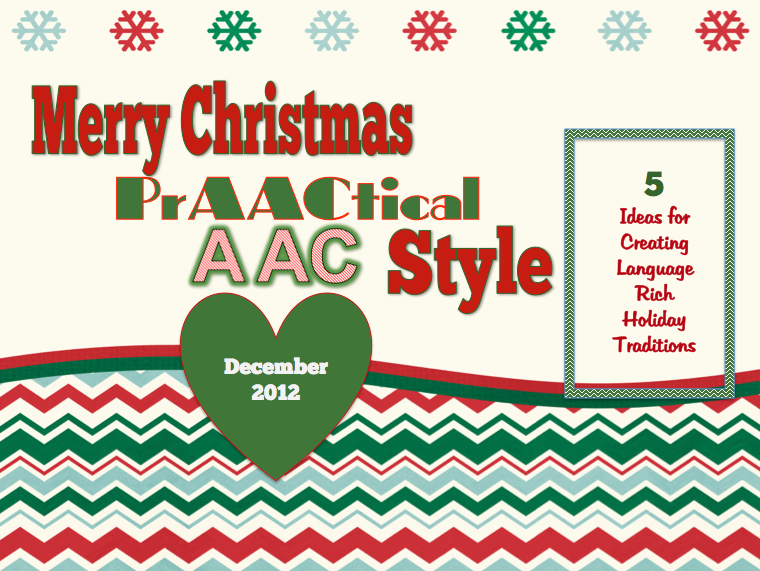
5 Ideas for Creating Language Rich Holiday Traditions The holiday season is a great time to initiate and continue traditions. Since we try to NOT create more work for ourselves if possible, most of our traditions have evolved from activities that helped us at some point. We like holiday traditions because they tend to ease the chaos by building in predictable routines. Each year we talk about traditions (for awhile this was a new vocabulary word), we sometimes write them down, illustrate them, and look at the list at the beginning of the next holiday season. Your family probably has many traditions that might just need to be named and organized. But if you are looking to add some new traditions, here are some of our favorites. If you have any, please share. Photography & Stories– Pictures are a great way to tell a story or talk about... [Read More...]









